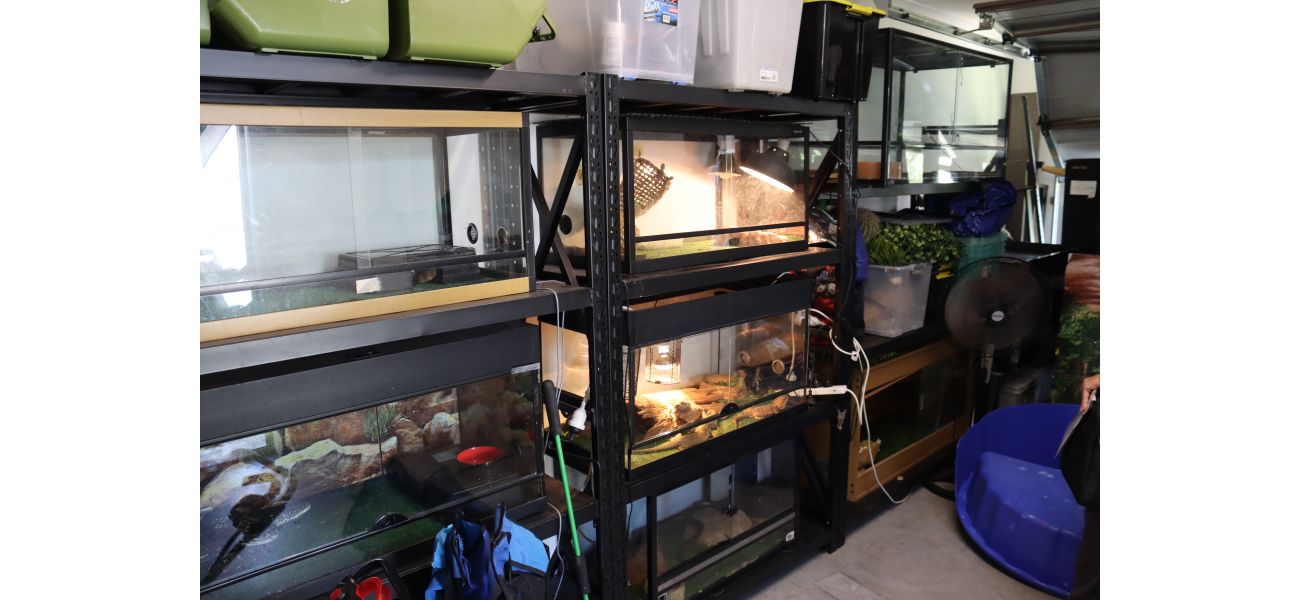Woman fined $20,000 for having 26 reptiles and 18 eggs in her home.
The remaining reptiles cannot be set free as they may face danger while being kept in captivity.
November 13th 2024.

A woman living in rural Queensland was recently fined $20,000 after wildlife officers discovered a concerning situation in her home. It all began on January 14th, when a member of the community raised concerns to authorities. As a result, wildlife officers and investigators went to the woman's home in Nambour, which is located in the north-western part of the Sunshine Coast.
Upon arrival, the officers found and confiscated a total of 26 reptiles, including a northern blue-tongued lizard, a woma python, a shingleback lizard, an inland bearded dragon, and a broad-shelled turtle. They also discovered 18 reptile eggs. Unfortunately, an examination of the animals revealed that many of them were in poor health, with issues such as tissue death, dehydration, neurological defects, and overall poor health. Some of the animals were in such dire condition that they had to be humanely euthanized.
Senior wildlife officer Jonathan McDonald expressed his sadness over the situation, stating that it was unfortunate that several of the reptiles were beyond help. He also mentioned that the surviving reptiles could never be released back into the wild due to the risk of exposing them to diseases they may have been exposed to while in captivity.
Further investigation revealed that the woman had been illegally keeping these reptiles without a valid license. She had also purchased animals from unlicensed sellers and was operating a reptile business. In addition, she could not provide the necessary records of sale for 13 of the reptiles she had purchased.
As a result of her actions, the woman was charged with four offenses and brought to court. However, in a surprising turn of events, she was not convicted. Instead, she was ordered to pay a hefty fine of $20,000, along with an additional $1600 in legal and court fees. The decision was made after considering the woman's past history, her awareness that her actions were illegal, and the protected status of some of the animals found in her home.
The Department of the Environment, Tourism, Science, and Innovation emphasized that this case serves as a warning to others. They reminded the public that there has been an increase in people trying to make a profit from the high demand for unique wildlife on both domestic and international markets. According to McDonald, illegal wildlife trafficking is estimated to be a $27 billion industry globally and is now ranked as the fourth most profitable illegal trade, following drugs, counterfeit products, and human trafficking. It is a concerning trend that needs to be addressed and stopped to protect our precious wildlife.
Upon arrival, the officers found and confiscated a total of 26 reptiles, including a northern blue-tongued lizard, a woma python, a shingleback lizard, an inland bearded dragon, and a broad-shelled turtle. They also discovered 18 reptile eggs. Unfortunately, an examination of the animals revealed that many of them were in poor health, with issues such as tissue death, dehydration, neurological defects, and overall poor health. Some of the animals were in such dire condition that they had to be humanely euthanized.
Senior wildlife officer Jonathan McDonald expressed his sadness over the situation, stating that it was unfortunate that several of the reptiles were beyond help. He also mentioned that the surviving reptiles could never be released back into the wild due to the risk of exposing them to diseases they may have been exposed to while in captivity.
Further investigation revealed that the woman had been illegally keeping these reptiles without a valid license. She had also purchased animals from unlicensed sellers and was operating a reptile business. In addition, she could not provide the necessary records of sale for 13 of the reptiles she had purchased.
As a result of her actions, the woman was charged with four offenses and brought to court. However, in a surprising turn of events, she was not convicted. Instead, she was ordered to pay a hefty fine of $20,000, along with an additional $1600 in legal and court fees. The decision was made after considering the woman's past history, her awareness that her actions were illegal, and the protected status of some of the animals found in her home.
The Department of the Environment, Tourism, Science, and Innovation emphasized that this case serves as a warning to others. They reminded the public that there has been an increase in people trying to make a profit from the high demand for unique wildlife on both domestic and international markets. According to McDonald, illegal wildlife trafficking is estimated to be a $27 billion industry globally and is now ranked as the fourth most profitable illegal trade, following drugs, counterfeit products, and human trafficking. It is a concerning trend that needs to be addressed and stopped to protect our precious wildlife.
[This article has been trending online recently and has been generated with AI. Your feed is customized.]
[Generative AI is experimental.]
0
0
Submit Comment





